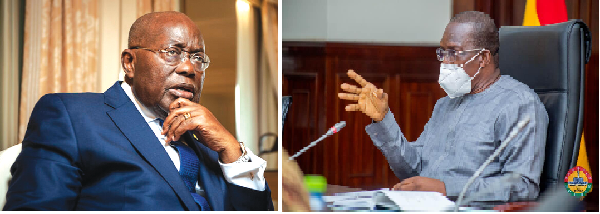
The President’s political dilemma
Parliament recently passed the Human Sexual Rights and Family Values Act 2024, commonly referred to as “the anti-gay bill.”
The President, Nana Addo Dankwa Akufo-Addo, has withheld his assent or otherwise for now pending the resolution of a Supreme Court case over the legislation. The situation has, however, escalated with a series of events – a) Parliament’s attempt to transmit the bill to the presidency, an exercise of its duty; b) a strongly worded letter from the presidency instructing Parliament not to attempt transmission and c) the Speaker of Parliament’s response to the presidency by halting consideration of the President’s nominations for various ministerial and deputy ministerial positions. And to add, Parliament has adjourned sine die.
In my opinion, these events have created a political dilemma for the President.
The dilemma operates on two fronts – a) dealing with the external world and how giving assent to the legislation potentially changes the relationship between Ghana and its key allies and b) dealing with the internal dynamics of the election year, the opposition and Ghanaian attitudes on matters of human sexuality.
Response of international community
There is no doubt that President Akufo-Addo is the President of Ghana. His first obligation, therefore, is to the country and its people. At the same time though, Ghana is part of an international community and has built important relationships with countries and institutions whose concerns the President cannot outrightly dismiss.
If we think the international community is not paying attention, here are a few headlines that greeted the passage of the legislation – a) New York Times - Ghana's Parliament Passes Anti-Gay Bill With Jail Terms; b) CNN- Ghana's Parliament passes anti-homosexuality bill; c) UN Office Of The High Commissioner For Human Rights- Ghana: Türk alarmed as Parliament passes deeply harmful anti-gay bill; d) Reuters - Ghana Parliament passes stringent anti-LGBTQ law and e) NBC - Ghana’s anti-LGBTQ bill draws international condemnation after it is passed by Parliament.
If the President withholds his assent, it is reasonable to conclude that the international community will welcome that. If he gives assent, there will be further condemnation and possibly some consequences for the country. We do not know yet what those may be although, in a memo that found its way into the public domain, the Ministry of Finance noted financial consequences of this legislation becoming law.
In discussing the response of the international community, the reaction is always “we are a sovereign country.” I agree with that sentiment. We are indeed a sovereign country and it is entirely our decision on how we respond to emerging issues of gender and human sexuality.
How the President reconciles Ghana’s sovereignty with the expectations of the international community is a reality he faces in dealing with this legislation.
The internal politics
But even if the international community was not an issue, there is the internal politics the President must deal with. If the President gives his assent to the legislation, he will be aligned with the opposition, and more important, the general Ghanaian sentiment on human sexuality. The dilemma goes away. Politically, whether ruling or opposition party, the politics of the legislation becomes a zero-sum game.
In withholding his assent for now, especially in an election year, it creates political headaches mainly for his party. The President is not on the ballot in 2024 but his party is. In consequence, any actions or inactions on his part create either an asset or liability for his party. Is the President ready for his party to be portrayed as the party not in alignment with the general sentiments of Ghanaians? Beyond the current stand-off with Parliament, is the President and his party ready for a stand-off with a large section of Ghanaian society on this issue? Is the President and his party ready to cede political advantage on this issue instead of neutralising it? Given the bipartisan nature of the bill, are NPP Members of Parliament worried about their election and, therefore, unhappy at the President’s withholding of assent for now?
These are the political questions racing through my mind.
What should the President do?
It is tempting to say ignore the international community and do what the internal politics suggests — give assent to the legislation. The international community cannot be ignored and I do not encourage politics as the overriding motivation for acting.
So, what should the President do? I don’t know. I, however, know that whatever the President does now or after the Supreme Court issues a decision, the reaction will be different from the external and the internal world.
The question is simply this — at the end of the day, who is it more important to make happy? And who can the President afford to incur their displeasure?
I do not envy you, Mr President!
The writer is the Executive Director of Democracy Project, a political think tank.
